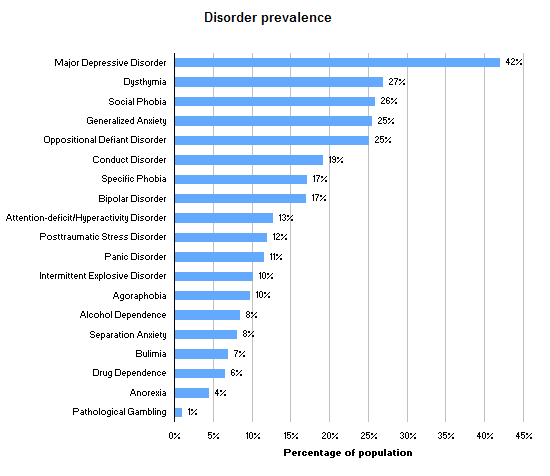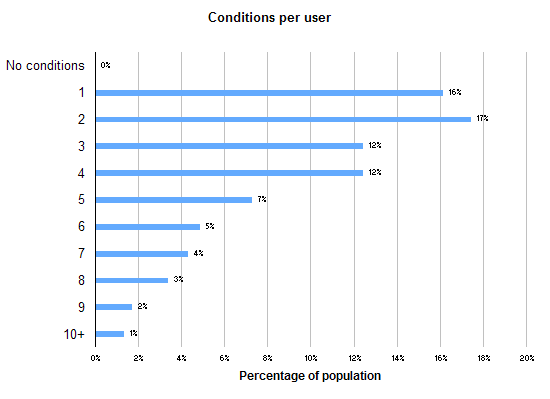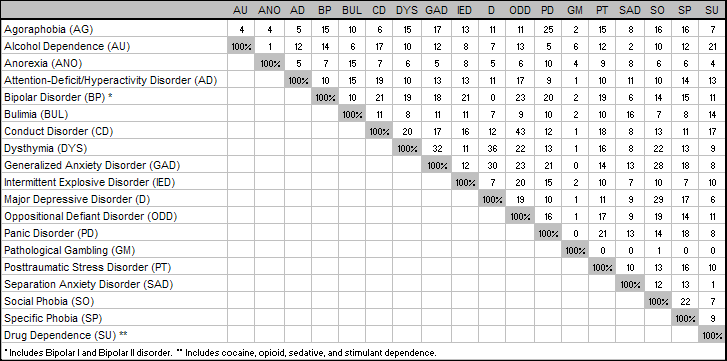David Baxter PhD
Late Founder
Mindsite Data Findings - you are likely not alone
MindSite
March 13, 2009 ? 22:20
The Mindsite Mental Health Assessment is an online adaptation of the World Health Organization Composite International (WHO-CIDI) designed to test for symptoms of several mental health disorders based on criteria defined in the DSM-IV. In contrast to the structured interview method used by the original instrument, Mindsite's implementation of the WHO-CIDI is delivered as a self administered online survey. We finally got our v3 of Mindsite up and running in December of last year, which we designed as a single pathway for all users - since then, we've been collecting some very interesting data.
While the computer adaptive nature of the assessment causes completion requirements to vary based on each user's unique symptom set, overall statistics indicate an average length of 200 questions and an average completion time of about 25 minutes. The following analysis has been conducted based on data collected between January 26, 2009 and March 7, 2009 and represents 540 completed surveys.
Note that this data reflects lifetime incidence of mental health issues. Here is what users of Mindsite look like when viewed as a group:

Of the people who completed the Mindsite self-assessment, 80% met the criteria for at least one DSM-IV mental health issue in their lifetime. Of the people who tested positively for at least one diagnosis, 80% of these people met the criteria for one or more additional diagnoses as shown in the second graph below.

If you are interested, the co-morbidity findings are below. This graph tells you that for people who have one disorder or the other, what is the probability that they will have both.

The strongest correlation among the Mindsite population existed between Oppositional Defiant Disorder and Conduct Disorder. Of the patients who tested positively for either if these disorders, nearly 43% met the criteria for both conditions. Other notable correlations existed between Depression & Dysthymia (36%), PTSD & Panic Disorder (21%), and Alcohol & Substance Dependence (21%).
MindSite
March 13, 2009 ? 22:20
The Mindsite Mental Health Assessment is an online adaptation of the World Health Organization Composite International (WHO-CIDI) designed to test for symptoms of several mental health disorders based on criteria defined in the DSM-IV. In contrast to the structured interview method used by the original instrument, Mindsite's implementation of the WHO-CIDI is delivered as a self administered online survey. We finally got our v3 of Mindsite up and running in December of last year, which we designed as a single pathway for all users - since then, we've been collecting some very interesting data.
While the computer adaptive nature of the assessment causes completion requirements to vary based on each user's unique symptom set, overall statistics indicate an average length of 200 questions and an average completion time of about 25 minutes. The following analysis has been conducted based on data collected between January 26, 2009 and March 7, 2009 and represents 540 completed surveys.
Note that this data reflects lifetime incidence of mental health issues. Here is what users of Mindsite look like when viewed as a group:

Of the people who completed the Mindsite self-assessment, 80% met the criteria for at least one DSM-IV mental health issue in their lifetime. Of the people who tested positively for at least one diagnosis, 80% of these people met the criteria for one or more additional diagnoses as shown in the second graph below.

If you are interested, the co-morbidity findings are below. This graph tells you that for people who have one disorder or the other, what is the probability that they will have both.

The strongest correlation among the Mindsite population existed between Oppositional Defiant Disorder and Conduct Disorder. Of the patients who tested positively for either if these disorders, nearly 43% met the criteria for both conditions. Other notable correlations existed between Depression & Dysthymia (36%), PTSD & Panic Disorder (21%), and Alcohol & Substance Dependence (21%).
